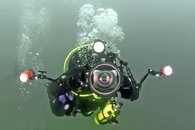Hello, and thanks for reading this
Im trying to make a decision about training in the upcoming season, and while I realize that this is a personal call, I know that there are a lot of very experienced and helpful divers in our community, who might think of something that I have overlooked. I dont expect to be told what to do, but if any of the tech divers out there are bored today and want to throw some insights my way, I would appreciate it!
I have been diving for about 15 years, but time and work does not allow me to get in as many dives as I would like. I have a little over 350 dives logged, about 60 at Dutch Springs (our local quarry), and 27 in the northeast Atlantic in the NY area. Lately I have been trying to do more local diving, and have become active in a dive club.
The main thing that I like about diving is photography, previously just stills but over the past year, I have been shooting video. It is a fairly heavy rig (7D in a Nauticam housing with dual Inon strobes and a Mangrove video light). I dive dry locally, single steel 120s with a slung aluminum 30 pony bottle.

I have been considering doing tech level training with the idea of moving to doubles and some degree of deco, to better match the sort of diving that the others in my club are doing. I have explored this with a few local instructors, and I have a number of good options. Of course, I could also just continue diving with the club within rec limits (which I enjoy), there are plenty of wrecks here where I am not limited by NDL or gas, and some of the locals dive singles.
SO, here is what I have so far for pros and cons of moving forward with my training:
Pro:
-Improved skills all around, irrespective of specific deco techniques
-Longer dives, deeper wrecks
-Better match with other divers in my club in terms of run time, dive planning
-Wont necessarily need to change tanks over for second dive with a single set of doubles
-Challenge of learning these new skills and deco physiology
Con:
-Time commitment
-Cost (I can swing this, but not inconsequential)
-Need to leave the camera during training, and possibly during some challenging dives
-Eventual task loading (camera and deco)
-Increased risk
Your thoughts?
Thanks!
Mike
Im trying to make a decision about training in the upcoming season, and while I realize that this is a personal call, I know that there are a lot of very experienced and helpful divers in our community, who might think of something that I have overlooked. I dont expect to be told what to do, but if any of the tech divers out there are bored today and want to throw some insights my way, I would appreciate it!
I have been diving for about 15 years, but time and work does not allow me to get in as many dives as I would like. I have a little over 350 dives logged, about 60 at Dutch Springs (our local quarry), and 27 in the northeast Atlantic in the NY area. Lately I have been trying to do more local diving, and have become active in a dive club.
The main thing that I like about diving is photography, previously just stills but over the past year, I have been shooting video. It is a fairly heavy rig (7D in a Nauticam housing with dual Inon strobes and a Mangrove video light). I dive dry locally, single steel 120s with a slung aluminum 30 pony bottle.
I have been considering doing tech level training with the idea of moving to doubles and some degree of deco, to better match the sort of diving that the others in my club are doing. I have explored this with a few local instructors, and I have a number of good options. Of course, I could also just continue diving with the club within rec limits (which I enjoy), there are plenty of wrecks here where I am not limited by NDL or gas, and some of the locals dive singles.
SO, here is what I have so far for pros and cons of moving forward with my training:
Pro:
-Improved skills all around, irrespective of specific deco techniques
-Longer dives, deeper wrecks
-Better match with other divers in my club in terms of run time, dive planning
-Wont necessarily need to change tanks over for second dive with a single set of doubles
-Challenge of learning these new skills and deco physiology
Con:
-Time commitment
-Cost (I can swing this, but not inconsequential)
-Need to leave the camera during training, and possibly during some challenging dives
-Eventual task loading (camera and deco)
-Increased risk
Your thoughts?
Thanks!
Mike




 . Other folks are awesome above the water, but I wouldn't do anything beyond a shallow reef dive with them. Look for balance between the two.
. Other folks are awesome above the water, but I wouldn't do anything beyond a shallow reef dive with them. Look for balance between the two.
